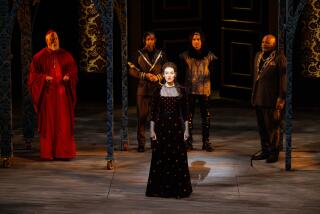Those dashing actors
- Share via
SAN DIEGO — A performance of “Macbeth” is underway at the Old Globe Theatre’s outdoor venue in Balboa Park. But two of the actors are nowhere nearby. Katie MacNichol and Bruce Turk, a married couple who play Lady Macduff and the Bloody Captain, are nearly a mile away, in their temporary apartment north of the park.
It’s changing-of-the-guard time. The object of their vigil is their son Alexander, 18 months old, who recently went to bed.
Turk has completed his brief but noticeable role near the beginning of “Macbeth,” removed his bloody makeup (“otherwise I would terrify passing motorists”) and bicycled back to the apartment to take over parental watch duties from MacNichol, whose appearance isn’t required until the second act.
They exchange a few words. Turk reports on the feeling of the performance so far (“light, tempered”). MacNichol notes that Alexander was asleep before the 8 p.m. curtain time.
Then MacNichol’s out the door.
An actor’s way of life can follow many permutations. In L.A. and New York, actors usually go from one audition to the next -- and, if they’re successful, from one project to the next.
But in a few enclaves in the United States, actors still work in repertory theater, which calls for a different set of rhythms altogether.
In rep, a single group of actors tackles several productions on alternating nights. The company works together for longer than they would for a normal show. They stay in one place, unlike a tour.
In Southern California, the most recent example of such a company performs the summer season of three Shakespeare plays at the Old Globe. Together for nearly six months of rehearsals and performances, they live in adjacent apartments owned by the Old Globe.
They get together for barbecues, game nights, Barbara Stanwyck movies and “Six Feet Under,” sometimes joined by festival director Darko Tresnjak. “I know some directors would like to keep separate, but it would be a lonely way to live,” he says.
For Turk, the company represents “a loose family.” “There’s time to develop friendships,” he says. “And people have come to know us as a couple with a child.”
Liam Craig, an actor who recently moved from New York to L.A., offers another analogy: “It’s like camp.”
Yet these campers have demanding responsibilities. Unlike L.A. -- where “if you work 10 days out of the year, you’re doing well,” says Craig -- the Old Globe season is virtually unrelenting. It begins in April with daily rehearsals, then adds evening rehearsals and previews. The climax is a week with three opening nights, followed by the beginning of understudy rehearsals. It ends in October.
“You can explore these humongous roles in the way they were meant to be played when they were written,” says Charles Janasz, another actor who normally lives in L.A. “You can see how the different worlds reflect off each other in a way you can’t when they’re isolated.” And the actors get to stretch -- dispelling the notion that “actors are cast because of who they are” instead of what they can do.
Cast members sometimes keep focus by reminding themselves that tonight they’re in Scotland (“Macbeth”) or Ephesus (“Comedy of Errors”). After the initial rehearsals, Deirdre Lovejoy (perhaps best known for the TV series “The Wire”) said she found herself completing a performance of “Comedy of Errors” and wondering, “How can I go to Scotland? I am so not there. It’s hard to get out of the airport.”
But somehow she made the shift. “It’s very mysterious,” she says. “But because that shift is so radical, it makes a better show. You don’t have the luxury of saying, ‘I was there last night; just let my body take over.’ ”
MacNichol leaves Turk and little Alexander in their apartment and drives to the theater on “Macbeth” nights. As she approaches her assigned parking space in back, she turns off the lights so as not to distract performers or audience.
She can hear the actors’ amplified voices as they near the end of the first act, so she knows if she has arrived on time. “If Banquo’s being murdered, I’m in good shape,” she says.
As a safety measure, the actors normally review the blocking of fight scenes backstage before the show. But to accommodate MacNichol’s mom duties, the actors go over her big scene -- in which her character is killed -- during intermission.
She takes a bow at the end of the play, while Turk is at home with Alexander. But their sequence of appearances was reversed during last summer’s production of “Antony and Cleopatra”: Turk got to take the curtain call while MacNichol was home with the baby.
They play much more prominent roles in the other two productions. On those evenings, they both take their bows, because they pay a sitter to watch Alexander.
Their “wacky little system” was Tresnjak’s idea, Turk says. “It certainly takes the edge off child care.”
Tresnjak says that Turk and MacNichol “are so worth having, and that made it sane for them.”
Turk regrets that he can’t take the curtain call, but the audience “sees plenty of me in the other shows. I was given the option to not be in ‘Macbeth.’ But I said I’d rather play a small part. I really wanted to be in the rehearsal room.”
He should enjoy it while he can. MacNichol is expecting another child on Nov. 30. “I can’t imagine how it’s going to work,” Turk says.
More to Read
The biggest entertainment stories
Get our big stories about Hollywood, film, television, music, arts, culture and more right in your inbox as soon as they publish.
You may occasionally receive promotional content from the Los Angeles Times.










